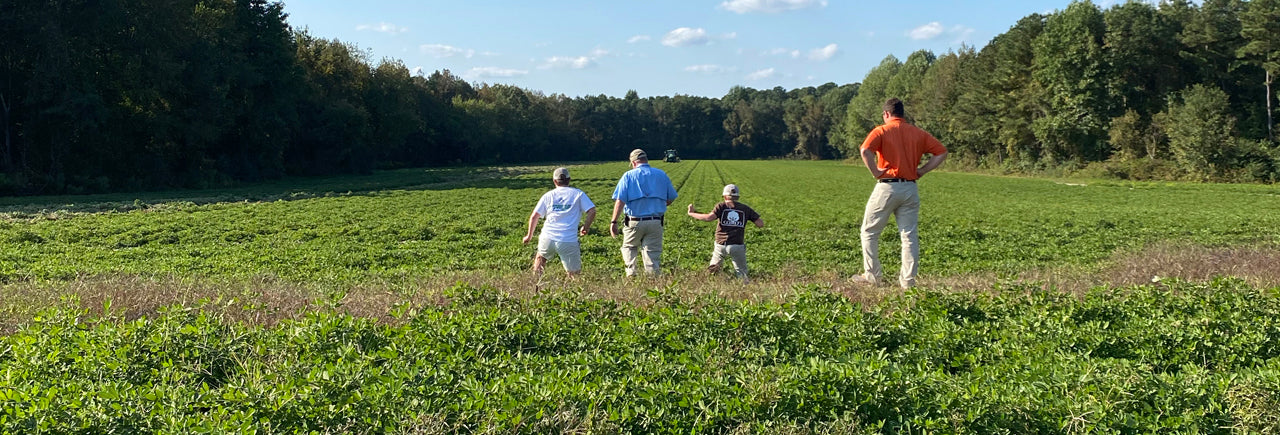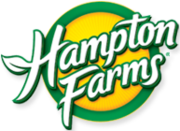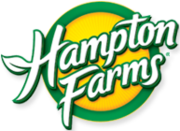A Day on a Peanut Farm

Have you ever visited a peanut farm? If not, we were in the same boat—until I got the opportunity to visit Leggett Farms, run by Brent and Sue Leggett in Nashville, North Carolina. As I arrived on the farm, I was welcomed into a huge facility where their sweet potatoes are sorted, packed, and stored. We chatted around their outside office table to learn more about the history of the farm before heading out to the fields, where I experienced first-hand how peanuts are grown and harvested.
Getting into Farming
In 2005, Brent’s employer retired from farming, so Brent and Sue decided to buy his operation. Anyone who works in agriculture knows how hard it is to create a successful first-generation farm these days; however, Leggett Farms hit the ground running. Their diversified crop production has them farming “14 months out of the year,” according to Brent.
Peanuts did not come into the picture until 2012, when the first seeds were planted. While reminiscing on his childhood days, Brent recalled much of his time being spent picking peanuts on his grandfather’s farm and being fascinated by the crop. Fast-forward to today, and his grandfather is still his inspiration for growing the crop. Brent firmly believes that farmers are the backbone of the community, and being one has ultimately shaped his character and kept him motivated through good times and bad.

Peanut Picking Process
You might be wondering, do peanuts grow on trees like almonds? Do they grow underground? On bushes? Like many people, I had no idea how peanuts were grown until the Leggetts shared their knowledge with me.
Peanuts are planted in the early spring and harvested in the fall. A process called digging takes place about a week before they’re harvested. Digging is pretty much what it sounds like, pulling the peanut plants out of the ground and inverting them so the hulls are able to air out. Lucky for us, Brent and his crew just started digging when we visited, so we got to see the process in action.
When I asked how they know the peanuts are ready to be harvested, I was stunned with a very simple answer—a good pocketknife. Brent uses a technique with his pocketknife to gauge the optimal time to harvest the crop, based on peanut maturity and hull color brightness.
After the peanuts are dug up and dried for about a week, a combine is used to harvest the peanuts. The combine is a piece of machinery that separates the plant from the peanut during the harvesting process to make it quick and efficient. The peanuts are stored in a big basket attached to the combine, while the excess material is shot back out through a chute.

The Future for Farming
As the global population continuously grows, sustainability remains a hot topic. Leggett Farms prides itself on operating a sustainable business that still earns a profit. The farm holds the highest level of food safety certifications for each of its products, and the team soil samples their plots and fertilizers, prioritizes worker safety, and uses cover crops. Cover crops are plants that are put in the ground to simply cover the soil, and are not for harvesting. Brent’s family farm uses wheat as their cover crop underneath the peanuts to manage soil erosion, soil quality, as well as weeds, pests, etc. These sustainability practices are reliable and reasonable to implement.
Brent’s advice to the younger generation of farmers is that timeliness and attention to details are the key components of being a successful peanut farmer. “Nothing is fast about peanuts,” says Brent. “From the growing process to harvesting, the process is slow and precise.”
Hampton Farms is proud to partner with high-quality, family-owned, local peanut producers like Leggett Farms. My visit opened my eyes to all the hard work that goes into peanut farming, and I’m so grateful for people like Brent and Sue whose dedication keeps us stocked with delicious, protein-packed peanuts year-round.



Leave a comment